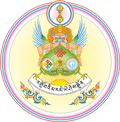How Do We Meditate?
In order to meditate in a way that is genuinely beneficial, it is important to find an experienced and well qualified teacher who can show how it is done properly. However, to give a brief idea of appropriate beginning meditation techniques, here is a short and simple introduction.
Since mental distraction is such an ingrained and often unconscious habit, we need a way to anchor ourselves in the present moment. There are many different techniques that can be effectively used. For example we can focus on an outer object for support, such as something to look at, like a stone, a light or running water, or alternately something to listen to, like birds singing or soft music. We can also choose to focus on an inner object for support, such as a visualisation or a mantra. All these have the same purpose: to help us focus, develop mindfulness and calm our minds.
In this example here, we are going to use our breath as a focus to support meditation. First, we find a comfortable posture. The traditional posture is sitting cross-legged on the floor in what is called the 'lotus position', but it is also fine to sit on chair. What is important is to ensure our back is straight and the back of our neck is in line with our spine. This helps us remain alert and not drift off to sleep. It also helps us not to get backache. We relax physically and gradually turn our attention to our breathing. We breathe naturally, preferably through the nose, and don't attempt to control our breathing. We focus on becoming aware of the sensation of the breath as it enters and leaves the nostrils. This sensation is our 'object of meditation' which means that whenever our mind wanders off into thought we notice this and bring our attention back to our breath.
When we first start meditating, it is very normal to feel a bit discouraged because our mind seems to be running everywhere. Thoughts and emotions keep cascading into the quiet space we are trying to create, and often they aren't very pleasant. The truth is, however, this is actually a useful experience. It shows us first-hand what has been going on all the time in our minds and we've just not noticed. It also gives us insight into how useful being able to still all that activity will be.
The other thing we tend to discover when first meditating is a strong tendency to follow our thoughts and get caught up in them. Into the quiet space we are trying to create suddenly comes a thought about Uncle Bert's birthday and before we know it, we're thinking about whether the cake will be nice or not, if we should get it from the bakery and whether or not the baker's wife is still seeing the milkman! In meditation we learn to gently resist this pull. We simply notice that we are thinking, but instead of following it, we bring our attention back to the sensation of breathing.
There is often the misconception that in meditation we are supposed to try to stop thinking altogether. This isn't very realistic, so the aim of meditation is not to empty our minds of thoughts. Instead, they are free to come and go like clouds passing through the sky and we practice watching them, but not sailing away with them. Indeed, what we are attempting to do with meditation is teach ourselves how to have a different relationship with our thoughts and emotions. Instead of habitually grasping hold of those we like, pushing away those we don't like and ignoring the rest, we are learning to be open to them, to all of our experiences in a calm and compassionate way.

